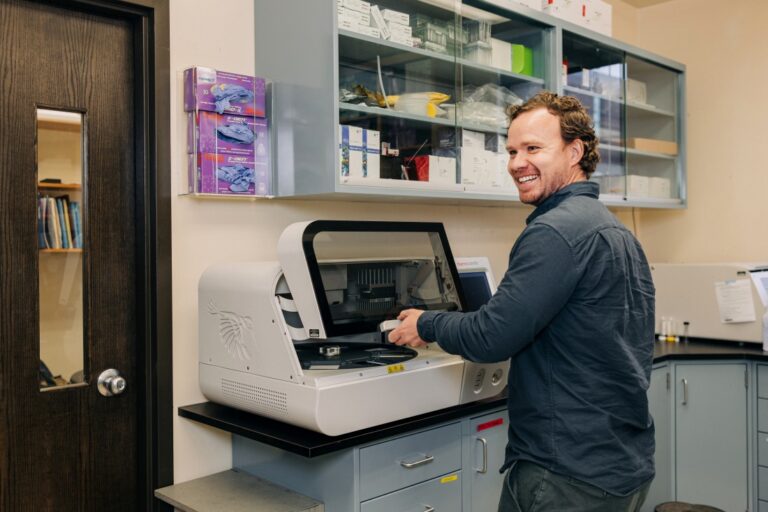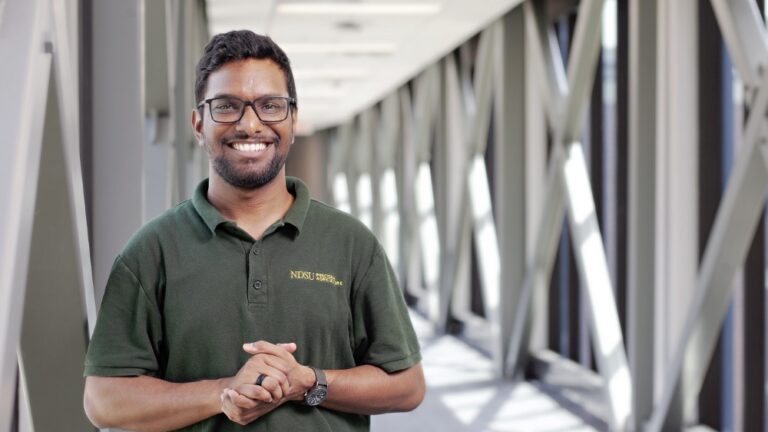With support from Richard '65 and Linda Offerdahl, NDSU researchers are working toward a new evolutionary event that will reduce the cost...
Read MoreThe 'Master Connector'
Dr. Bill Wilson ’75, one of the world’s most influential agricultural economists, leverages his international network to create connections between students and the industry.
Story by Micaela Gerhardt | Photos by Kensie Wallner | September 30, 2025
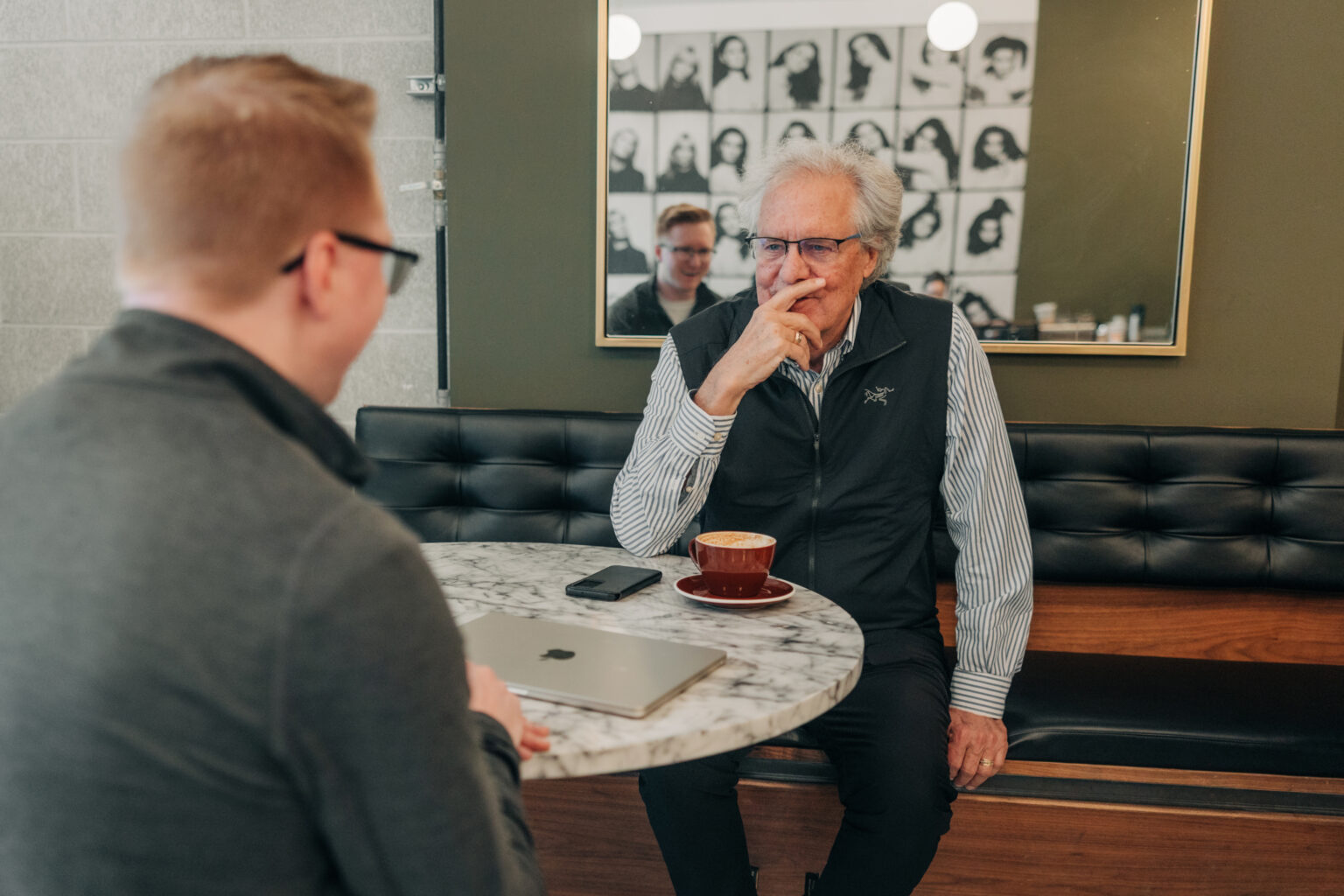
With a 24/7 news cycle, it can be difficult to keep up with the latest developments. But NDSU students enrolled in Introduction to Commodity Trading with Dr. Bill Wilson ’75 have an incentive to stay informed.
Every Tuesday, class begins with Bill giving a five-minute summary of a recent development that impacts world commodity markets — say U.S. tariffs on key trading partners, droughts on the Danube River, or attacks on commercial ships in the Black or Red Sea. Then, he calls on students randomly, asks them to stand up, and fires off questions about world news and its impact on commodity markets. They have one minute to answer and demonstrate that they’re conversant.
“I’ve found it to be a very teachable moment,” Bill said. “At the end of the semester, the students thrive on it. Not all of them thrive at the same rate, especially early on, but I’m trying to teach and elevate everybody.”
Bill, who has earned a reputation as one of the most influential agricultural economists in the world, is the CHS Chair in Risk Management and Trading and a University Distinguished Professor at NDSU, where he has been a professor for 45 years.
“For any senior professor, what keeps you going is how well your students do, and I have a ton of them who’ve done well.”
–Dr. Bill Wilson ’75, CHS Chair in Risk Management and Trading
Throughout his career, Bill has taught more than 2,200 undergraduate students and advised more than 70 graduate students, many of whom have earned C-suite positions in large agribusinesses, commodity companies, railroads, and food and beverage companies in the U.S. and abroad.
“I think for any senior professor, the real benefit — what keeps you going — is how well your students do,” Bill said, “and I have a ton of them who’ve done well.”
In addition to teaching, Bill is a highly active researcher, consultant, and board member for public and private agricultural companies who seek his expertise in commodity marketing, risk and strategy, agricultural technology, and transportation and logistics. Currently, he serves as the board chair of NCH Capital, one of the largest private equity funds invested in Russian/Ukrainian agriculture, as well as local firms AMITY and 701-X.
“People reach out to him from all over the world,” former student Mike Ricks ’84 said. “I mean, who gets asked by a Russian exchange to come and help them design a futures contract? A professor at North Dakota State University in Fargo.”
Mike is the first graduate student Bill ever advised. He says Bill has leveraged his international network to connect students to the industry since his earliest years as a professor. In fact, Bill helped secure the interview that led to Mike’s first job out of college: a position with Continental Grain Company, which was later acquired by Cargill.
At Cargill, a multinational food corporation, Mike managed the wheat, soybean, and corn desks and spent five years gaining valuable market insights in Geneva, Switzerland. This allowed him to see the world of commodity marketing from many different angles. Today, Mike serves as Cargill’s vice president of trading and merchandising.
“With his contacts in the industry, Bill is able to open the door and give his students the opportunity to land very good jobs,” Mike said. “He takes it personally and works hard at making those connections.”
It’s a sentiment that echoes across generations of students. Ashley Ritteman ’10 grew up in Rugby, North Dakota, and developed an interest in international business after spending a semester abroad in Singapore. Knowing she wanted to return to her North Dakota roots, Ashley decided to pursue a master’s degree in agribusiness and applied economics at NDSU.
Bill served as Ashley’s thesis advisor. He ensured she had the grant support needed to conduct her thesis on a personal passion area: expanding global trade for North Dakota businesses. This thesis led to the launch of Valor Victoria in 2016, an inland supply chain company that has exceeded $1 million in revenue, placing it among the top 1.9% of women-owned businesses (Forbes). Ashley is its co-founder and CEO, and her husband, Thomas Ritteman ’08, ’10 — another of Bill’s former students — is its chief analyst.
“Bill is a master connector, and that was so valuable for a student like me who wanted to do really big things but remain in North Dakota.”
–Ashley Ritteman ’10, co-founder and CEO of Valor Victoria
Ashley says Bill possesses a wealth of valuable business information from his experience as a board member and consultant. From navigating tariffs to scaling a business to the influence of geopolitical factors, Bill remains the businessperson Ashley turns to whenever she needs advice.
“I always felt that coming from a small, rural town in North Dakota, I didn’t have the social capital to springboard onto a larger stage,” Ashley said. “But Bill is a master connector, and that was so valuable for a student like me who wanted to do really big things but remain in North Dakota.”
This is where Bill’s story begins too: a North Dakota kid with the drive to make an impact. Inspired by his mother, who was an accountant, Bill developed an interest in economics. In 1971, he enrolled at NDSU, the university just down the road from where he grew up.
During his junior year in college, Bill was accepted into a study abroad program in India, which sparked his curiosity about world affairs. He had never been out of the country before, never been on an airplane.
“It was 1974. We had Nixon, Watergate, Vietnam. We favored Pakistan in the India-Pakistan war. We opposed India’s development of nuclear power,” Bill said, recalling the unique geopolitical circumstances during his semester abroad. “I matured a lot during that time — I learned about our country because I was in another country.”
After earning his undergraduate degree in economics from NDSU the following year, Bill went to the University of Manitoba, where he earned a Ph.D. in agricultural economics and continued to study through an international lens.
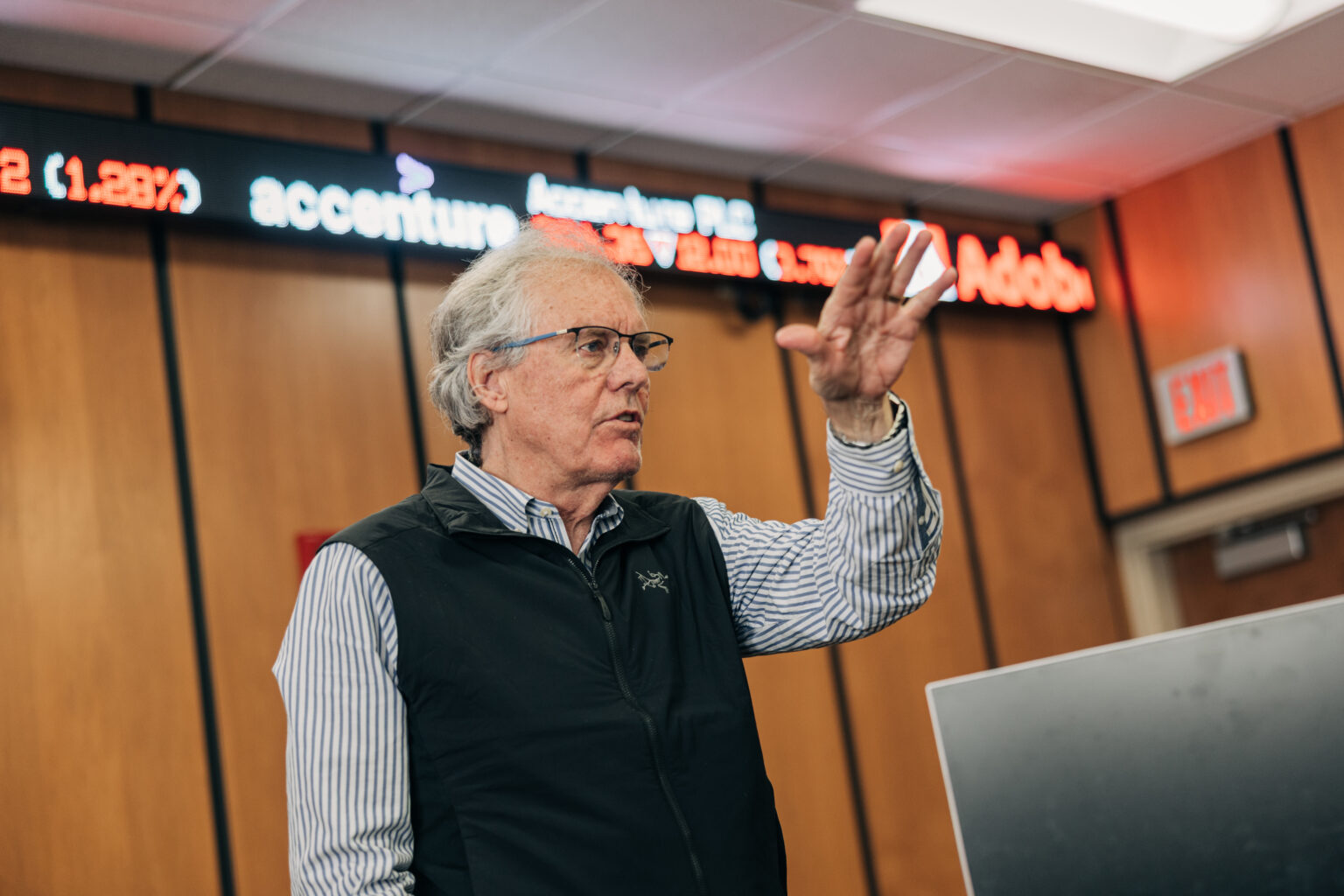
He was hired as a professor at NDSU in 1980. At that time, commodity markets were relatively stable — there was little risk and limited opportunities. If the price of wheat changed 10 cents in a year, it was notable. His classroom came equipped with a blackboard and chalk.
Today, things are different. The geopolitical landscape is highly unpredictable, making markets more volatile. The price of wheat might fluctuate by 40 cents before 9 a.m. And Bill teaches in the Commodity Trading Room, where NDSU students in agribusiness and applied economics have access to the most cutting-edge technology in the industry, making market news instantaneously available.
The NDSU Commodity Trading Room opened its doors in 2012. Inside, students are invited to explore financial data, news, research, and analytics around the clock.
“You didn’t just have to use textbooks and theory. You could be like, ‘Alright, let’s pull corn prices, go create a data set, run a regression, then upload that data, run a Monte Carlo simulator, and run the distribution,’” former student Dylan Kallman ’22 said.
Dylan says he spent more hours in the Commodity Trading Room than in his own apartment — often clocking 10 hours on Saturday and 10 more on Sunday. With 24/7 access to 11 Bloomberg terminals (now there are 12), he was able to develop skills and gain confidence with industry tools.
The gift and privilege of this access became clear when Dylan talked with a friend at another university who was sharing one Bloomberg terminal with all the other students in his program — using it required making a reservation weeks in advance.
“When I got to a job interview, they didn’t have to wonder, ‘Is he entry level? Could he figure it out?’ because I could go into detail,” Dylan, a corporate development and merger and acquisition analyst at Ulteig and co-founder of Great Plains Greens, said. “That room is absolutely critical. The more hours students spend in it, the greater their career opportunity will be.”
The Commodity Trading Room was driven by Bill’s vision — though at first, he had to be persuaded. It took a group of former students serving alongside him on the Minneapolis Grain Exchange to convince Bill to abandon his blackboard teaching methods.
“They said, ‘The world of commodity trading and marketing is becoming electronic, and if you’re going to train people to work in this profession, you’ve got to expose them to it,’” Bill remembers.
He began meeting with campus leadership, peers at other universities, and industry members. Rick Dusek ’88, a former student and the executive vice president of ag retail, distribution, and transportation at CHS, was a partner in early conversations.
“That was a distinct change in NDSU’s approach to and connection with industry, because Bill reached out and said, ‘Tell me what we need to do to prepare students better,’” Rick said. “It was a key, transformational moment for NDSU and the industry, quite frankly.”
Rick says that when NDSU graduates come to CHS with trading room experience, they require less training and have greater opportunity to jumpstart their careers.

“When I was young, it took me a couple years of training before I got my first big risk management job,” Rick said. “Now, if somebody comes in and really understands the marketplace and knows how to use the technology, it could be a matter of months.”
Experiencing how the Commodity Trading Room improved student and industry outcomes led to even greater collaboration between NDSU and CHS, the nation’s leading farmer-owned cooperative. In 2016, the company established the CHS Chair in Risk Management and Trading. Bill was named its inaugural holder.
“It’s an honor and a responsibility,” Bill said. “I’m not only representing the University; I’m representing the industry. What does industry want? More students, better training, and better technology, so that guides everything I do.”
Funds from the NDSU Center for Trading and Risk increase access to education and help meet workforce needs. The endowment generates stipends for four to six graduate students annually, including two with a focus in agricultural technology, and five additional $15,000 scholarships.
“That’s a big number, but what is the goal? The goal is to recruit the smartest people there are, who really want to work in these fields, and give them good training, because when they go out to be leaders, they’re going to be stars,” Bill said.
Long before Bill became an NDSU student, and later, a professor, campus was his playground. In the 1960s, Bill and his three brothers learned to skateboard by practicing on the small slope in front of the NDSU Library.
The world today is different than the one that existed then. It’s different from 1974, when Bill spent a semester abroad in India, and from 1975, when he graduated from NDSU with his degree in economics.
It’s different from 1980, when Bill earned his Ph.D. and accepted a teaching position at NDSU, and from 1987, when he went on sabbatical at Stanford University. Different from the 2010s, when he was named a University Distinguished Professor, mobilized efforts to establish the Commodity Trading Room, and became the inaugural CHS Chair in Risk Management and Trading. But one thing remains constant.
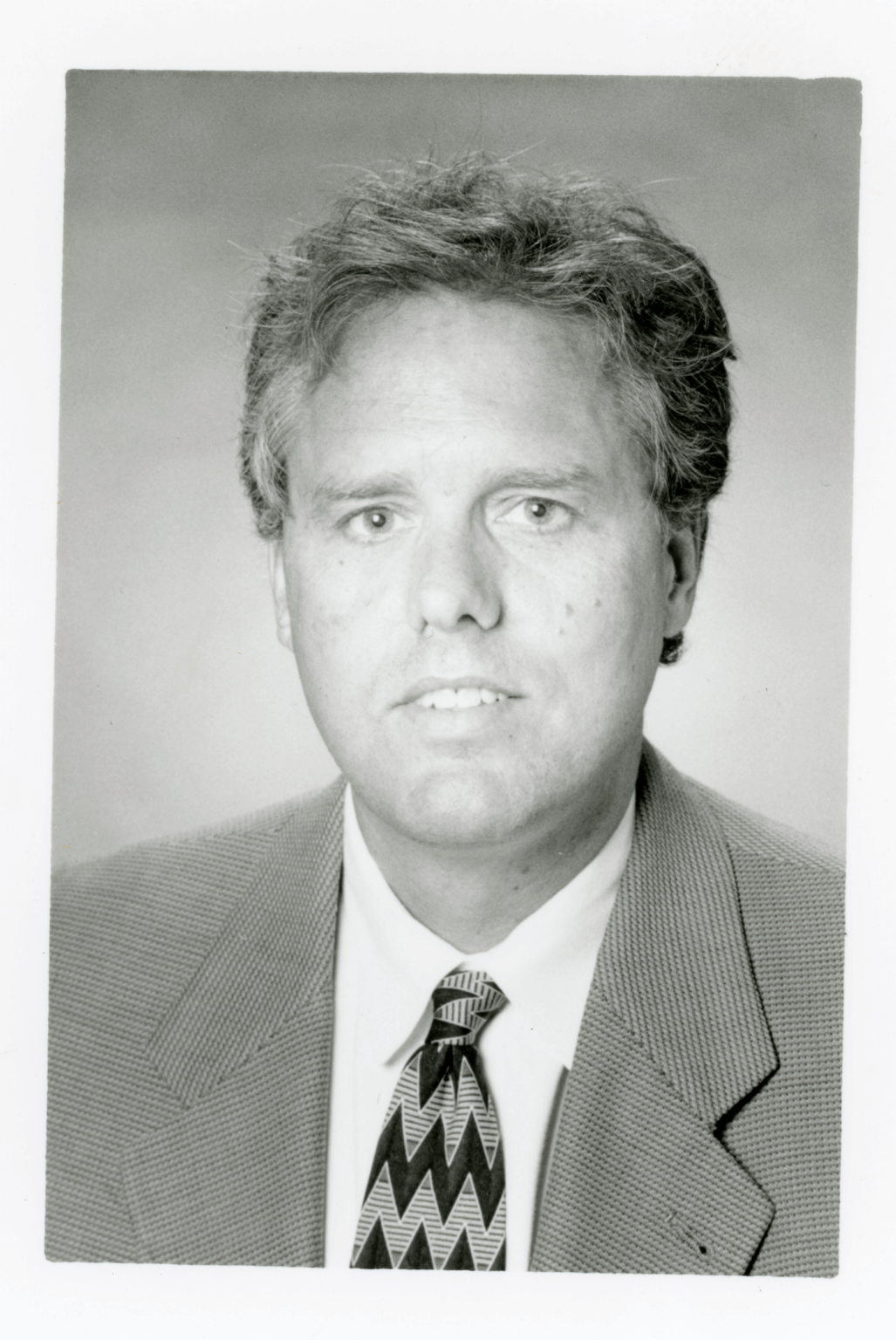
On a recent return flight to Fargo from the snow-dusted mountains of Sun Valley, Idaho, where Bill enjoys skiing, the man sitting beside him turned to him and asked, “You’re Dr. Wilson, aren’t you?”
He explained that Bill had been his professor, and later his son’s professor.
For Bill, this exchange illustrates the impact of his life’s work.
“One of the reasons I keep teaching,” Bill says, “is that not a week goes by without somebody saying to me, ‘You were my professor.’ Not a week. That is the reward: having an impression on your students who remember you.”
A closer look: Bill mentors co-founder of Great Plains Greens






Three NDSU alumni are growing produce without soil. Their method of choice? Vertical hydroponics. A climate-controlled 9-by-40-foot shipping container in West Fargo, North Dakota, provides optimal growing conditions where the plants can thrive year-round.
Dr. Bill Wilson ’75 helped his former students Dylan Kallman ’22, Lee Vetsch ’20, and Jon Wyffels ’19 write a successful grant application to kickstart their business. Great Plains Greens now supplies fresh produce to local restaurants, schools, and online customers.
Dylan, one of the co-founders of Great Plains Greens, continues to meet with Bill regularly. He credits Bill for making connections that led to five of the six internship opportunities he had as an NDSU student and says Bill continues to expand his professional network post-grad.
“As a mentor, Bill is really consistent, caring, and wants to plug students into the industry,” Dylan said. “It’s a real relationship — he helps you build your career path, but also your character.”
Share This Story
Related Stories
The Next Era of Agriculture Is Autonomous
NDSU researchers are exploring how artificial intelligence and precision agriculture practices can help protect resources, support farmers, and sustain the nation’s food...
Read More